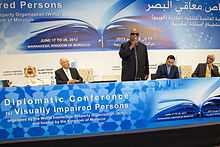Marrakesh VIP Treaty
| Marrakesh Treaty to Facilitate Access to Published Works to Visually Impaired Persons and Persons with Print Disabilities | |
|---|---|
 Stevie Wonder addresses the Marrakesh Diplomatic Conference on 28 June 2013. | |
| Type | multilateral |
| Signed | 28 June 2013 |
| Location | Marrakesh, Morocco |
| Condition | Ratification of 20 states |
| Signatories | 79 |
| Parties | 6 (El Salvador, India, Mali, Paraguay United Arab Emirates, Uruguay) |
The Marrakesh VIP Treaty, formally the Marrakesh Treaty to Facilitate Access to Published Works by Visually Impaired Persons and Persons with Print Disabilities, is a treaty signed in Marrakesh, Morocco, on 28 June 2013.[1][2]
The treaty focuses on copyright exceptions to facilitate the creation of accessible versions of books and other copyrighted works. It sets a norm for countries ratifying the treaty to have a domestic copyright exception covering these activities, and allowing for the import and export of such materials.
Fifty-one countries signed the treaty as of the close of the diplomatic conference in Marrakesh. The ratification of 20 states is needed for the treaty to go into effect.[3]
The treaty is the second international trade treaty associated with Marrakesh, the other being the Marrakesh Agreement which established the World Trade Organization in 1994.
On 27 March 2014, Israel passed legislation implementing the Marrakesh VIP Treaty. The Israeli implementing legislation is broader than the language of the treaty in a number of ways.[4] India ratified the treaty on 24 July 2014 and was the first country to do so.[5] [6] El Salvador, Mali, the United Arab Emirates, and Uruguay also ratified in 2014. In 2015, the treaty was ratified by Paraguay.
As of 6 July 2014, 79 countries had signed the Treaty. In March 2015, an unusually harsh statement by the Council of the European Union accused the European Commission of delaying the adoption of the treaty by EU and called «upon the Commission, in accordance with Article 241 TFEU, to submit without delay the necessary legislative proposal».[7][8]
Building on his earlier work around access for the print disabled to E-Books and other printed material, Harpur has argued that the Marrakesh Treaty represents a paradigm shift in how the copyright world approaches accessibility and persons with print disabilities. Even though the Marrakesh Treaty is a positive step, Harpur and Suzor argues that more needs to be done to fully recognise persons with disabilities right to read as posited in the United Nations Convention on the Rights of Persons with Disabilities.[9][10][11]
References
- ↑ Diplomatic Conference to Conclude a Treaty to Facilitate Access to Published Works by Visually Impaired Persons and Persons with Print Disabilities World Intellectual Property Organization
- ↑ Between the lines: Blind people defeat lobbyists in a tussle about copyright The Economist, 20 July 2013
- ↑ Stevie Wonder Hails Landmark WIPO Treaty Boosting Access to Books for Blind and Visually Impaired Persons World Intellectual Property Organization
- ↑ Israel Technology Law Blog: Israel Implements Marrakesh Treaty
- ↑ Contracting Parties > Marrakesh VIP Treaty (Treaty not yet in force) World Intellectual Property Organization
- ↑ India ratifies Marrakesh Treaty for visually impaired The Hindu
- ↑ http://tacd-ip.org/archives/1325
- ↑ http://www.statewatch.org/news/2015/apr/eu-council-marrakesh-treaty-guidance-7321-15.pdf
- ↑ Paul Harpur and Rebecca Loudoun, ‘The Barrier of the Written Word: Analysing Universities’ Policies to Include Students with Print Disabilities and Calls for Reforms’ (2011) 33 Journal of Higher Education Policy and Management 2, 153-167;
- ↑ Paul Harpur, 'Ensuring equality in education: How Australian laws are leaving students with print disabilities behind' (2010) 15 Media and Arts Law Review 1, 70-83; Nic Suzor, Paul Harpur and Dylan Thampapillai, ‘Digital Copyright and Disability Discrimination: From Braille Books to Bookshare’ (2008) 13 Media and Arts Law Review 1-17.
- ↑ Paul Harpur and Nic Suzor, ‘Copyright Protections and Disability Rights: Turning the Page to a New International Paradigm’ (2013) 36 University of New South Wales Law Journal 3, 33, 745-778.